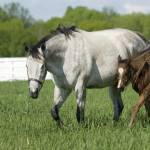Maintaining Broodmares on High-Forage Diets

Traditional diets for broodmares involve high volumes of concentrate during late gestation and lactation. In some regions of the world, mares are known to be able to maintain well on diets of predominantly forage. Researchers at the University of Kentucky studied whether gestating mares would be able to maintain weight with free-choice intake of alfalfa (lucerne) or timothy hay, and whether lactating mares could maintain weight with free-choice alfalfa hay.
Twelve pregnant and twelve nonpregnant mares were fed either an alfalfa or timothy hay diet, but only alfalfa during lactation, with a ration balancer to supply protein, vitamins, and minerals. During the fifth and tenth months of gestation, and during the third month of lactation, mares underwent a voluntary dry matter intake (VDMI) collection to determine daily intakes of the different hays. Mares were fed enough hay every day that would allow for at least 4.4 lb (2 kg) of leftover, so researchers could be sure horses were getting as much as they wanted. Hay was fed in hay bags hung over large tubs, and all wastage was subtracted from the amount of hay offered to calculate intakes. During the VDMI collection periods, mares were weighed twice a week to monitor weight loss. Percent body weight consumption was calculated from the VDMI.
During midgestation, intakes were 1.99 +/- 0.09% and 1.89 +/- 0.15% body weight for alfalfa and timothy, respectively. Intake during late gestation dropped to 1.88 +/- 0.09% and 1.79 +/- 0.14% body weight for alfalfa and timothy, respectively. Mares were not able to maintain their body weight with the timothy hay during late gestation. Lactating mares consumed 2.45 +/- 0.07% body weight of the alfalfa but also could not maintain their weight on the hay and balancer pellet alone.
Maintaining broodmares on high-forage diets was adequate for mares in midgestation, but in late gestation mares need higher quality forage like alfalfa to maintain weight. Intakes of forage did not increase during gestation, but did increase during lactation. Alfalfa will supply a majority of the calories needed to maintain weight and milk production during lactation, but mares might need additional calorie sources if high-quality forage is not available.
This study was presented at the 2011 Equine Science Society Symposium in Murfreesboro, Tenn. The proceedings from this symposium are available from the Journal of Equine Veterinary Science.








